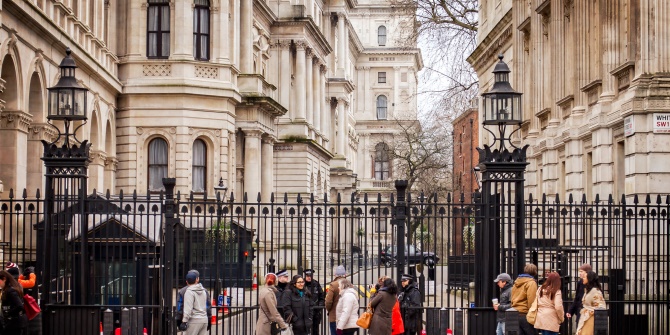 At the time of Alan Turing’s death, Britain was gripped by a McCarthyite-style anti-homosexual witch-hunt. A thorough, comprehensive inquiry is needed in order to establish for certain what role, if any, the security services played in the run-up to his death, writes Peter Tatchell.
At the time of Alan Turing’s death, Britain was gripped by a McCarthyite-style anti-homosexual witch-hunt. A thorough, comprehensive inquiry is needed in order to establish for certain what role, if any, the security services played in the run-up to his death, writes Peter Tatchell.
The time has come for a long overdue public inquiry into the death of the scientist Alan Turing and for an apology and pardon for around 100,000 men who were, like him, convicted under discriminatory anti-gay laws.
Turing is generally believed to have committed suicide in 1954, following his conviction and chemical castration for homosexual offences. He was prosecuted under the 1885 ‘gross indecency’ law that sent Oscar Wilde to jail for two years in 1895. However, the original inquest into his death was perfunctory and inadequate. Although it is said that he died from eating an apple laced with cyanide, the allegedly fatal apple was never tested for cyanide. Moreover, he was in an upbeat mood at the time of his death and making plans for the future – not the typical profile of a person who takes their own life.
A new inquiry is long overdue, even if only to dispel any doubts about the true cause of his death – including speculation that he had been hounded by the security services. Did they pressure him and did this pressure contribute to his suicide?
We know that Turing was under observation and a person of concern to the security services. He was regarded as a high security risk because of his homosexuality and his expert knowledge of code-breaking, advanced mathematics and computer science.
At the time of his death, Britain was gripped by a McCarthyite-style anti-homosexual witch-hunt. Gay people were being hounded out of the armed forces and the civil and foreign services. In this frenzied homophobic atmosphere, all gay men were regarded as security risks – open to blackmail at a time when homosexuality was illegal and punishable by life imprisonment. Doubts were routinely cast on their loyalty and patriotism, especially following the unmasking of the bisexual and gay spies, respectively Donald Maclean and Guy Burgess.
Turing fell under suspicion. His security clearance was withdrawn and he was barred from further work at the spy agency GCHQ. Was he also subjected to MI5 or MI6 surveillance, pressure and threats? It is time we knew the truth.

The security services were certainly fearful that Turing was vulnerable to blackmail and anxious that he might pass information to the Soviets. The British nuclear scientist Klaus Fuchs was convicted in 1950 of assisting the Soviet Union’s atomic bomb programme. There was an irrational, paranoid fear that other leading scientists, such as Turing, might also aid the Soviets; in Turing’s case possibly as revenge for the way he’d been mistreated.
There is, of course, not a shred of evidence that Turing ever considered betraying Britain. But the fevered minds of security spooks thought otherwise. Enough to watch and pressure him? And perhaps push him over the edge? This is why a thorough, comprehensive inquiry is needed. We need to establish for certain what role, if any, the security services played in the run-up to his death.
The other big issue thrown up by Turing’s 2013 posthumous pardon is: why him alone? Singling out Alan for a royal pardon just because he was a great scientist and very famous is wrong. At least 50,000 other men were convicted under the same ‘gross indecency’ law. In addition, a further 50,000 men were convicted under other homophobic laws, such as the statutes against buggery, procuring, importuning and so on. None of these 100,000 men have ever been offered a pardon and, on current form, will never get one. Selective redress is a bad way to remedy a historic injustice.
An estimated 15,000 men convicted of the same offence as Alan Turing are still alive. They deserve justice too. A full apology and pardon is due to all of the 100,000 men who, like Turing, were convicted of consenting same-sex relationships. These men were criminalised and penalised for victimless behaviour that was not a crime between heterosexual men and women.
The precedent for a mass pardon is the government’s granting of a pardon in 2006 to more than 300 soldiers who were executed for alleged cowardice and desertion during World War One. If they can have a pardon, why not gay and bisexual men?
Finally, it is little known that the homophobic laws under which Turing and 100,000 others were prosecuted remained on the statute book until 2003, classified in the penal code under the heading ‘unnatural offences.’ It was only in that year, for example, that the law against ‘buggery’ (anal sex) was repealed. It had been originally legislated in 1533 during the reign of King Henry VIII.
In other words, the criminalisation of homosexuality finally ended in 2003 in England and Wales. It is only since then that we have had a penal code that does not discriminate on the grounds of sexual orientation.
Note: This article gives the views of the authors, and not the position of the British Politics and Policy blog, nor of the London School of Economics. Please read our comments policy before posting.
About the Author
 Peter Tatchell is a political campaigner best known for his work with LGBT social movements. For more information about Peter Tatchell’s human rights campaigns, to receive his campaign e-bulletins or to make a donation: www.PeterTatchellFoundation.org
Peter Tatchell is a political campaigner best known for his work with LGBT social movements. For more information about Peter Tatchell’s human rights campaigns, to receive his campaign e-bulletins or to make a donation: www.PeterTatchellFoundation.org







